 Setup an IP Camera at the front door, and a Pi with a nice 7″ screen to see “who’s knocking”.
Setup an IP Camera at the front door, and a Pi with a nice 7″ screen to see “who’s knocking”.
10:00am
Q-College, Suite 303 – 771 Vernon Ave, Victoria, BC
presentation pdf
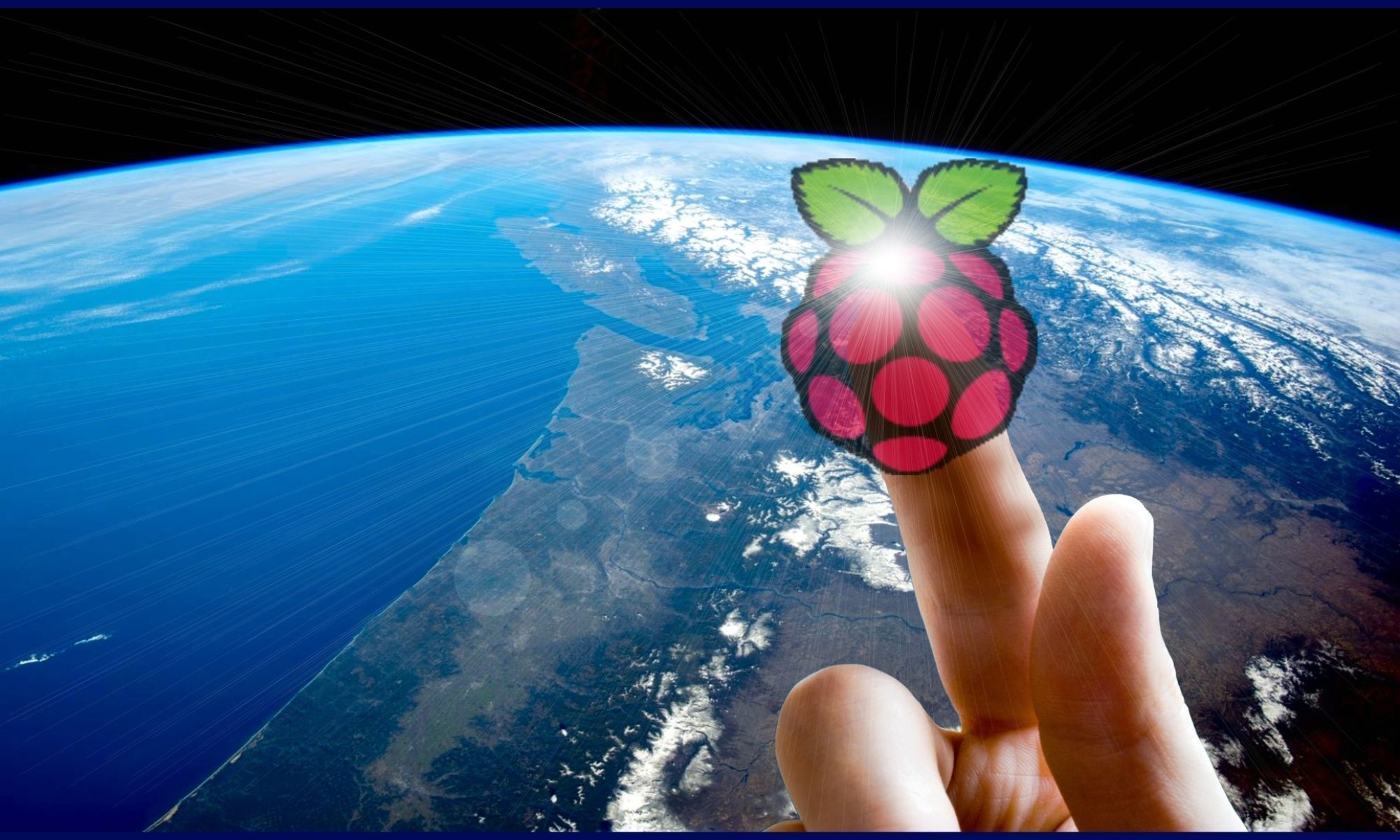
embedded systems to learn and create
 Setup an IP Camera at the front door, and a Pi with a nice 7″ screen to see “who’s knocking”.
Setup an IP Camera at the front door, and a Pi with a nice 7″ screen to see “who’s knocking”.
10:00am
Q-College, Suite 303 – 771 Vernon Ave, Victoria, BC
presentation pdf
Camosun College
Bldg: Technology Bldg, Room: Tech 177 – 4461 Interurban Rd, Victoria, BC (parking at lot 8 for park users)
10:00am

Docker is a computer program that performs operating-system-level virtualization, also known as “containerization”. A Container is a lightweight application component including all the required elements (libraries, config, etc). Containers can be quickly started up without polluting your file system with libraries, and config files, and easily upgraded with one command.
In this presentation, we’ll install docker on the Pi, and get nginx webserver up and running in a container. The presentation material can be found here.
Docker Software https://en.wikipedia.org/wiki/Docker_(software)
Saturday, November 10, 2018
10:00am
Q-College, Suite 303 – 771 Vernon Ave, Victoria, BC
 Hosted by George Bowden and Craig Miller
Hosted by George Bowden and Craig Miller
LIGHTS OUT, a possible life saver. An acquaintance fell in the washroom and was unable to raise attention for thirty hours, and never fully recovered. The monthly cost ($50) of wearable alert bracelets and the habit of not wearing them is a large risk to seniors living alone. This alarm system, based on an ESP8266 and a php web app, alerts friends that a bathroom light has been left on for way too long. The link to the presentation docs is here.
Saturday, October 6, 2018
10:00am
Q-College, Suite 303 – 771 Vernon Ave, Victoria, BC
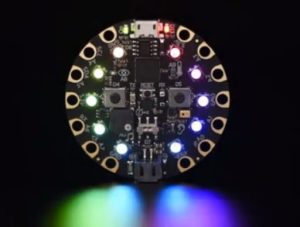 A shallow Dive into Adafruit’s Circuit Playground Express
A shallow Dive into Adafruit’s Circuit Playground Express
The Circuit Playground Express is a small, cheap($32) dev board from Adafruit Industries designed to introduce electronics and programming to the novice. It’s built around an ATSAMD21 ARM Cortex MO processor and is programmable with either circuitpython or Microsoft’s ‘Makecode’ block programming interface. The board also houses a variety of sensors (motion, temperature, light, touch), buttons, a slide switch and IR transmit/receive capability. In this presentation I’ll demo some of the easier projects that I’ve mastered and maybe include something using the Adafruit Crickit, and add-on board for the CPX designed for simple robotics. See the reading list here.
Hosted by Paul and Craig Miller
10:00am
Camosun College
Bldg: Technology Bldg, Room: Tech 259 – 4461 Interurban Rd, Victoria, BC (parking at lot 8 for park users) presentation pdf
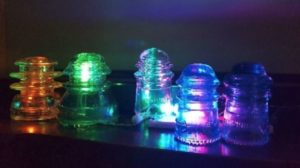
In this session, we’ll cover programming Neopixel LEDs driven by the ESP8266 using a Web Interface. We’ll cover the hardware interface to the LEDs as well as the web interface (running on the ESP8266 utilizing the PL9823).
In Part2, we’ll harden the installation by adding TLS/SSL and IPv6 support via NodeRed running on a Pi
10:00am
Q-College
Suite 303 – 771 Vernon Ave, Victoria, BC
 Welcome back from Summer. At this meeting we’ll be doing a show and tell, talking about what Pi (and others) projects we worked on over the summer break
Welcome back from Summer. At this meeting we’ll be doing a show and tell, talking about what Pi (and others) projects we worked on over the summer break
10:00am
Q-College
Suite 303 – 771 Vernon Ave, Victoria, BC
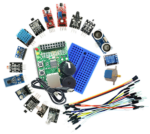 Jim’s presentation focuses on interfacing sensors and devices ( modules) to microcontrollers followed by actual examples. Two or more examples will be discussed using I/O from pulse inputs, IR transmitters/receivers, accelerometers, load cells, Bluetooth SPP and motion controllers.
Jim’s presentation focuses on interfacing sensors and devices ( modules) to microcontrollers followed by actual examples. Two or more examples will be discussed using I/O from pulse inputs, IR transmitters/receivers, accelerometers, load cells, Bluetooth SPP and motion controllers.
See the presentation document here.
10:00am
Q-College
Suite 303 – 771 Vernon Ave, Victoria, BC
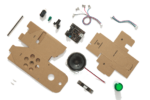 Along with everything the Google Assistant already does, you can add your own question and answer pairs. All in a handy little cardboard cube, powered by a Raspberry Pi.
Along with everything the Google Assistant already does, you can add your own question and answer pairs. All in a handy little cardboard cube, powered by a Raspberry Pi.
10:00am
Q-College
Suite 303 – 771 Vernon Ave, Victoria, BC
 Two views of Statistical Programming. The second in the series. R is a programming language and free software environment for statistical computing and graphics that is supported by the R Foundation
Two views of Statistical Programming. The second in the series. R is a programming language and free software environment for statistical computing and graphics that is supported by the R Foundation
10:00am
Q-College
Suite 303 – 771 Vernon Ave, Victoria, BC
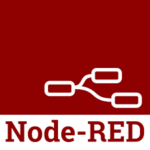 Node-RED is a programming tool for wiring together hardware devices, APIs and online services in new and interesting ways.
Node-RED is a programming tool for wiring together hardware devices, APIs and online services in new and interesting ways.
It provides a browser-based editor that makes it easy to wire together flows using the wide range of nodes in the palette that can be deployed to its runtime in a single-click.
Deid will connect his ESP8266 to nodeRed and show us how easy it is to put sensors online.
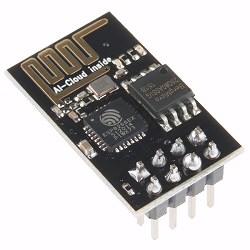 AND Mike will present MicroPython on the ESP8266. The presentation will share the Micropython breakthru that allows a $4 WiFi-enabled microprocessor to run a good portion of the Python standard library. It’s really quite amazing to have the Python REPL and filesystem built right into a microcontroller.
AND Mike will present MicroPython on the ESP8266. The presentation will share the Micropython breakthru that allows a $4 WiFi-enabled microprocessor to run a good portion of the Python standard library. It’s really quite amazing to have the Python REPL and filesystem built right into a microcontroller.
10:00am
Q-College
Suite 303 – 771 Vernon Ave, Victoria, BC
 One of the many cool things you can do with your Raspberry Pi is to add a $30 DVT-T (https://en.wikipedia.org/wiki/DVB-T) USB dongle and install some software to turn your Pi into a live flight data feeder for Flightradar24 (https://flightradar24.com/), FlightAware (https://flightaware.com/), and Plane Finder (https://planefinder.net/).
One of the many cool things you can do with your Raspberry Pi is to add a $30 DVT-T (https://en.wikipedia.org/wiki/DVB-T) USB dongle and install some software to turn your Pi into a live flight data feeder for Flightradar24 (https://flightradar24.com/), FlightAware (https://flightaware.com/), and Plane Finder (https://planefinder.net/).
10:00am
Q-College
Suite 303 – 771 Vernon Ave, Victoria, BC
 The Jupyter Notebook is an open-source web application that allows you to create and share documents that contain live code, equations, visualizations and narrative text.
The Jupyter Notebook is an open-source web application that allows you to create and share documents that contain live code, equations, visualizations and narrative text.
With the success of data science and big data analytics in the last decade, Python has emerged as a major language for data analytics. In 2014, Project Jupyter started as interactive, browser-based platform for data analysis and visualization in Python. Today, Jupyter is a widely adopted framework in industry and academia and has spawned many further applications. I will introduce the Jupyter Universe and discuss Jupyter’s advantages and its shortcomings. Together we will walk through a few of its various capabilities and extensions with Jupyter notebooks available at https://github.com/chritter/Talks/tree/master/VicPiMakers.
Finally I will discuss and demonstrate the rising star of the Jupyter project, Jupyter Lab.
Also, see notes here: http://vicpimakers.ca/tutorials/python-tutorial/the-jupyter-notebook/
10:00am
Q-College
Suite 303 – 771 Vernon Ave, Victoria, BC
 Two views of Statistical Programming. Python using Panda & PyNum libraries for statistical computing. And a following meeting, (28 April) with R a programming language and free software environment for statistical computing and graphics that is supported by the R FoundationTwo views of Statistical Programming.
Two views of Statistical Programming. Python using Panda & PyNum libraries for statistical computing. And a following meeting, (28 April) with R a programming language and free software environment for statistical computing and graphics that is supported by the R FoundationTwo views of Statistical Programming.
 10:00am
10:00am
Q-College
Suite 303 – 771 Vernon Ave, Victoria, BC
Another excellent presentation in the computer language series. This time, the venerable C language. If you want it to run fast, and be portable, C is the language for you. Hosted by Simon Bluck and Craig Miller. RSVP on Meetup here.
Intro to Pi & Others is a short monthly session to help get you up and running with your Pi or Other (embedded device). It is an unstructured hour-long session where you can ask questions, bring in your Pi or Other (and power supply), and get help with your project.
This month, learn the basics of GPIO and how to turn on/off a LED. We have extra green projects boards and LEDs to use. See you on Tuesday.

9:30am
Q-College
Suite 303 771 Vernon Ave, Victoria, BC
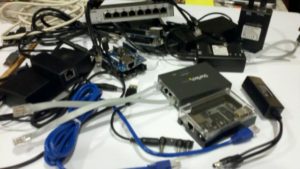 Discover the advantages of Power of Ethernet (PoE)! PoE is a technology that allows one to only run one cable to a distant device, just an ethernet cable. The distant device not only receives network connectivity, but also power from the single cable. This is good for small low power devices such as ESP8266 (embedded controller) boards. Hosted by Mark G. RSVP on Meetup here.
Discover the advantages of Power of Ethernet (PoE)! PoE is a technology that allows one to only run one cable to a distant device, just an ethernet cable. The distant device not only receives network connectivity, but also power from the single cable. This is good for small low power devices such as ESP8266 (embedded controller) boards. Hosted by Mark G. RSVP on Meetup here.
Here is a link to the presentation pdf.
What are two things that an Internet of Things (IoT) device
must have?
1. An avenue for communication.
2. Power.
There are a number of ways to satisfy both of these requirements
simultaneously. Item one can be fulfilled with:
– Wireless ethernet;
– Wired ethernet;
– Another radio based data exchange (nRF24L01 transceivers, Bluetooth)
to a network attached controller;
– 2G/3G (and friends) cellular connections;
I’m sure there are others.
Power can be handled variously by:
– A device specific transformer using a wall plug;
– A battery or set of batteries;
– A solar power panel w/battery;
– A power over ethernet cable;
I’ll discuss the ins, outs, pros and cons of these needs
and their combinations.
9:30am
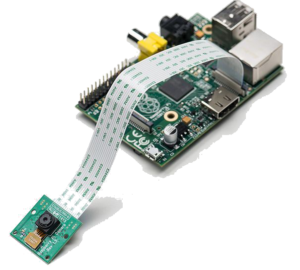 Andrew will share with us his trials and testing with IP -based Cameras, and integration with the Raspberry Pi.
Andrew will share with us his trials and testing with IP -based Cameras, and integration with the Raspberry Pi.
Q-College
Suite 303 771 Vernon Ave, Victoria, BC
View the presentation .pdf here.
MotionEye can support IPv6, see this Bug.
10:30am
 Why have a personal webserver? Easy distribution of files.
Why have a personal webserver? Easy distribution of files.
Why support IPv6 and IPv4? Not only is it cool, but it is very easy to do. IPv6 is the future of the internet, setting up a little personal webserver that supports both protocols will help you learn about the future.
Q-College
Suite 303, 771 Vernon Ave, Victoria, BC